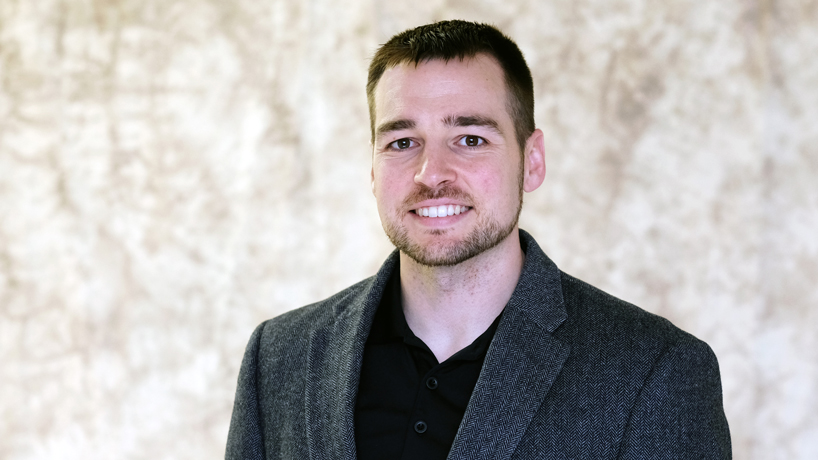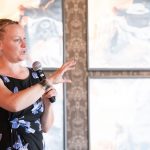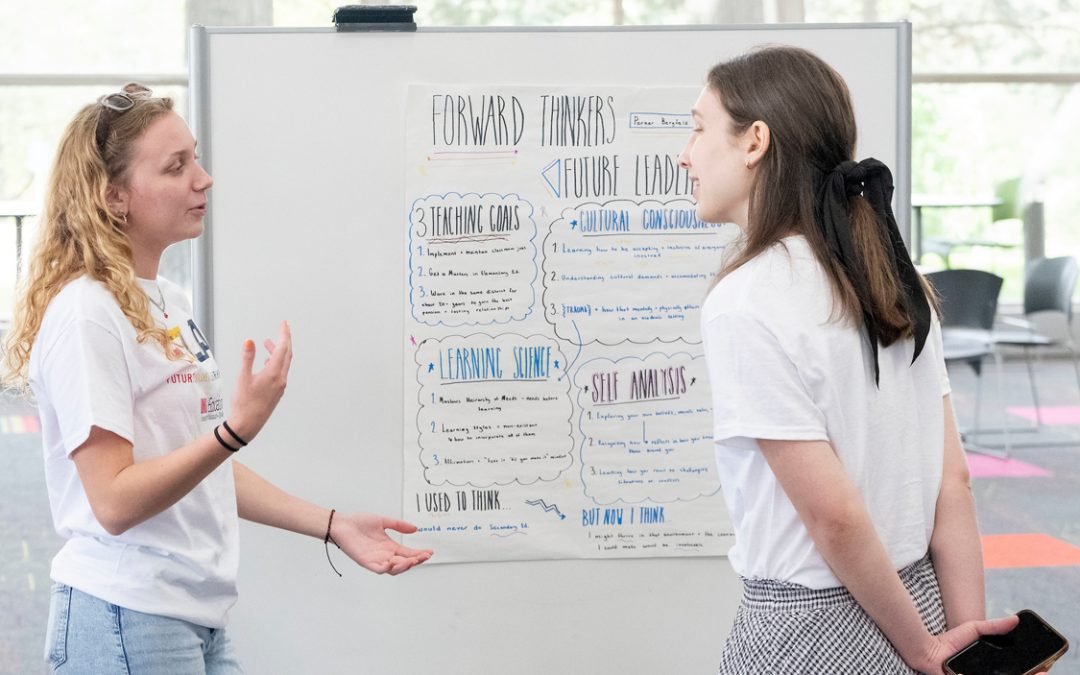
UMSL Assistant Professor of Social Work Michael Gearhart has performed more than 50 interviews with Ferguson residents and workers in the community as part of research analyzing how the city is bouncing back from the period of turmoil following the Michael Brown shooting, as well as how implicit bias informs outside views of its residents. (Photo by August Jennewein)
When Michael Gearhart was planning his move to St. Louis from Ohio in 2017, he heard multiple variations on the same comment cautioning him against residing in Ferguson.
The town, just about three miles down the road from Gearhart’s future employer, the University of Missouri–St. Louis, was still fresh in the public imagination after the 2014 officer-involved shooting death of Michael Brown and the civil unrest that followed, including a night of clashes between protesters and police that made international news.
“We’re much more comfortable mocking problems instead of talking about them,” said Gearhart, a UMSL assistant professor of social work. “We, as a country, do not do a great job of connecting where we are at today to how we got there.”
Gearhart is using his proximity to Ferguson to research how the community is bouncing back from that period of turmoil, as well as how implicit bias informs outside views of its residents. He is about a third of the way through a study examining the effectiveness of efforts undertaken by the Ferguson Community Empowerment Center to address the challenges faced by the city’s residents and also getting started on work examining police-resident relationships in the wake of the Brown shooting.
He presented his progress at the Early Career Research Symposium in October, where he found he wasn’t the only UMSL researcher focused on Ferguson.
“It was really powerful to see that we have people doing projects in Ferguson,” Gearhart said. “We are a very community-engaged school, and they’re 10 minutes down the road from us. It was good to see that UMSL is doing work there.”
Gearhart first became interested in civil rights and race relations in the U.S. growing up in Brecksville, Ohio, a suburb about 20 miles south of Cleveland. He would hear about Cleveland as a place with high levels of crime and homelessness, a place where you wouldn’t want to be caught in the wrong area.
He wondered why that was, how it got to be that just up the road from his community was a place that harbored such a negative reputation.
“We’re only talking a 20-to-30-minute drive in Cleveland,” Gearhart said. “In St. Louis, it’s even more interesting because, given all the municipalities, you could be across the street from an area that people talk about not wanting to go to. We all talk about the Delmar Divide like it’s a quirky thing that happened, and we don’t unpack how it got to be that way, that it was intentional.”
Through interviews with Ferguson residents, Gearhart is finding that this status can be a bit of a self-fulfilling prophecy. Outside perception labels the community as a problem area and, in turn, its citizens start feeling as if that’s their lot in life.
Gearhart quoted an interview respondent who said: “You don’t have control over your self-image, and failure almost becomes your brand. You don’t see something as a problem; you see it as just how things are.”
“It’s interesting because it’s almost like folks in that situation should be hopeless, but the people are so incredibly resilient,” Gearhart added. “There is such a strong recognition that people are still here, people are still trying and people are still picking up after Mike Brown.”
The FCEC, co-owned by the Urban League of Metropolitan St. Louis and the Salvation Army, opened its doors in July 2017. Those two organizations, along with Hope Lutheran Church, UMSL and MU Extension, provide services for the community such as job training, literacy programs and emotional therapy.
Gearhart has conducted more than 50 interviews for his research into the impact of the FCEC and hopes to do about 100 more before concluding his study next summer.
The other part of Gearhart’s work is more open-ended. He is examining what spurs collective action in communities and which factors determine how likely its residents will be to join.
Preliminary research has shown him that the stronger the bonds are between people in a community, the more likely it is that they’ll believe collective action will be effective in enacting change. Another important aspect is “authentic participation,” where people’s voices are actually being heard when it comes to solutions for their community, rather than being used as props to support possible solutions that have already been proposed.
“A lot of folks that I talk to say Ferguson is quiet,” Gearhart said. “It does have issues. It has challenges, but it’s nowhere near what people are thinking. Oftentimes when people do this work, there’s this perception of giving voice to a group. I’m not giving voice to anybody. I am asking for us all to listen and think before we respond.
“People in communities are told what’s wrong with them way more often than they’re told what’s right or what they do have. Changing the discussion from ‘you’re a problem to be solved’ to ‘you have something to bring to the table; you have value in this discussion,’ can change the mindset of areas and people. I want us to have a fuller conversation about our history. If you can see these connections between our past and present, we can do more to promote policies that address inequalities. I appreciate policy research, but I also think that a component we need to consider is people won’t care to get policies passed if they don’t care about the people those policies affect.”














